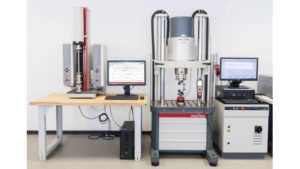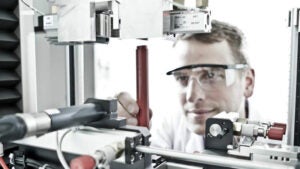Reliable Melt Index Value Determination with APC – Adaptive Parameter Configuration
The method usually employed for evaluating the quality of thermoplastic resins is by determining the melt mass flow rate (MFR) or the melt volume flow rate (MVR) (e.g. to ISO 1133). As the test is easy to carry out and requires relatively little equipment, it enjoys great popularity in the plastics processing, compounding and recycling industries.
With this method a plastic melted mass is extruded (using a piston) under a fixed load through a die of standardized dimensions. The MFR or MVR, which characterizes the flow property of the plastic, is obtained from the extrusion rate.
The MFR method requires determination of the weight of materials extruded in a certain time, whilst with MVR the piston travel over a fixed time period is determined. Thus the measured values are the time and the piston travel or weight of the extruded plastic.
When highly fluid plastic melted masses are being measured, a great deal of material flows through the die in a very short time, resulting in a correspondingly limited measuring time. Optimum measuring accuracy can be achieved by selecting the longest possible measuring time that still allows completion of measuring with the available amount of melted mass.
If highly viscous plastics are being tested, only a very small amount of material flows through the die. In this case care must be taken that the piston travel to be measured or the weight of material is sufficient to allow reliable determination.
Between these extremes is a wide range of applications for which it is necessary to set test parameters providing accurate determination of the required measured values, depending on the expected result, whilst remaining within the available measurement ranges.
In what is believed to be a unique feature on the market, the Automated Parameter Configuration (APC) system developed by Zwick for its new ‘Mflow’ plastometer, now completely automates this process. Measurement parameters covering the whole MFR range from zero to infinity are stored in ready-to-use tables. While the test is running the device’s software determines the current extrusion rate and automatically selects the most suitable parameters.
APC means that preliminary tests to determine suitable test parameters are largely a thing of the past. This offers considerable time savings, particularly when plastics with widely differing flow properties are to be tested; moreover, the continual parameter re-setting required by conventional devices is eliminated. Units with APC effectively have lifetime test sequence pre-programming.



